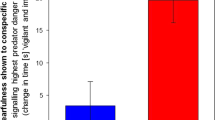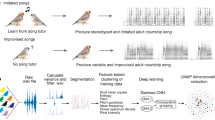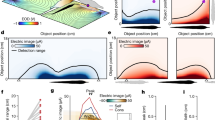Abstract
ACCORDING to the principle of natural selection, each individual animal is assumed to maximise its inclusive fitness1. Thus, observed behaviour patterns should result from optimisation processes involving costs and benefits measured in a currency of fitness2,3. Certain foraging strategies have been shown to maximise energy intake per unit time3–6. Maximisation of the rate of energy intake, however, is an optimal strategy only if feeding behaviour does not conflict with other needs, such as the detection of predators. If the foraging animal runs a high risk of being preyed upon, the optimal strategy may be a compromise of both needs. A predator's influence on optimal foraging has been dealt with, so far, only in a hypothetical manner3,5. We have investigated this problem experimentally using three-spined sticklebacks (Gasterosteus aculeatus) attacking a swarm of water fleas (Daphnia magna). We report here that after exposure to a model of an avian predator the sticklebacks' foraging behaviour changes such that they attack swarm regions of lower density which provide a lower feeding rate but should increase their ability to detect an approaching predator. This is predicted by a model using Pontryagin's principle of maximisation.
This is a preview of subscription content, access via your institution
Access options
Subscribe to this journal
Receive 51 print issues and online access
$199.00 per year
only $3.90 per issue
Buy this article
- Purchase on Springer Link
- Instant access to full article PDF
Prices may be subject to local taxes which are calculated during checkout
Similar content being viewed by others
References
Hamilton, W. D. J. Theor. Biol. 7, 1–53 (1964).
Sibly, R. & McFarland, D. Am. Nat. 110, 601–617 (1976).
Schoener, T. W. A. Rev. ecol. Sys. 2, 369–404 (1971).
Krebs, J. R., Erichsen, J. T., Webber, M. I. & Charnov, E. L. Anim. Behav. 25, 30–38 (1977).
Charnov, E. L. Am. Nat. 110, 141–151 (1976).
Pyke, G. H., Pulliam, H. R. & Charnov, E. L. Quart. Rev. Biol. 52, 137–154 (1977).
Milinski, M. Z. Tierpsychol. 45, 373–388 (1977).
Miller, R. C. Ecology 3, 122–126 (1922).
Welty, J. C. Physiol. Zool. 7, 85–128 (1934).
Clark, C. W. Mathematical Bioeconomics: The Optimal Management of Renewable Resources. (Wiley & Sons, New York, 1976).
Grzimek, B. Grzimeks Tierleben IX Vögel (Kindler, Zurich, 1970).
Phillips, G. C. thesis Univ. Oxford (1962).
Huntingford, F. A. thesis Univ. Oxford (1974).
Tugendhat, B. Science 132, 896–897 (1960).
Powell, G. V. N. Anim. Behav. 22, 501–505 (1974).
Author information
Authors and Affiliations
Rights and permissions
About this article
Cite this article
MILINSKI, M., HELLER, R. Influence of a predator on the optimal foraging behaviour of sticklebacks (Gasterosteus aculeatus L.). Nature 275, 642–644 (1978). https://doi.org/10.1038/275642a0
Received:
Accepted:
Issue Date:
DOI: https://doi.org/10.1038/275642a0
This article is cited by
-
Diving behavior in semi-aquatic Anolis lizards results in heat loss with sex-specific cooling tolerance
Behavioral Ecology and Sociobiology (2024)
-
The legacy of predator threat shapes prey foraging behaviour
Oecologia (2022)
-
Is Wilson’s religion Durkheim’s, or Hobbes’s Leviathan?
History and Philosophy of the Life Sciences (2021)
-
Breakdown of the ideal free distribution under conditions of severe and low competition
Behavioral Ecology and Sociobiology (2021)
Comments
By submitting a comment you agree to abide by our Terms and Community Guidelines. If you find something abusive or that does not comply with our terms or guidelines please flag it as inappropriate.



